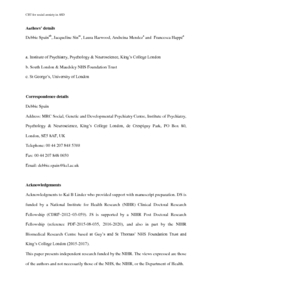Spain, D; Sin, PHJ; Harwood, L; Mendez, A; Happe, F
(2017)
Cognitive behaviour therapy for social anxiety in autism spectrum disorder: A systematic review.
Advances in Autism, 3 (1).
pp. 34-46.
ISSN 2056-3868
https://doi.org/10.1108/AIA-07-2016-0020
SGUL Authors: Sin, Pui Han Jacqueline
![[img]](https://openaccess.sgul.ac.uk/108489/1.hassmallThumbnailVersion/CBT%20for%20SA%20in%20ASD_author%20version%20pdf_.pdf)  Preview |
|
PDF
Accepted Version
Available under License ["licenses_description_publisher" not defined].
Download (382kB)
| Preview
|
Abstract
Purpose
Individuals who have autism spectrum disorders (ASD) commonly experience anxiety about social interaction and social situations. Cognitive behaviour therapy (CBT) is a recommended treatment for social anxiety (SA) in the non-ASD population. Therapy typically comprises cognitive interventions, imagery-based work and for some individuals, behavioural interventions. Whether these are useful for the ASD population is unclear. Therefore, the purpose of this paper is to undertake a systematic review to summarise research about CBT for SA in ASD.
Design/methodology/approach
Using a priori criteria, the authors searched for English-language peer-reviewed empirical studies in five databases. The search yielded 1,364 results. Titles, abstracts, and relevant publications were independently screened by two reviewers.
Findings
Four single case studies met the review inclusion criteria; data were synthesised narratively. Participants (three adults and one child) were diagnosed with ASD and SA. There were commonalities in interventions and techniques used: participants were encouraged to identify and challenge negative thoughts, enter anxiety-provoking social situations, and develop new ways of coping. Unlike CBT for SA in non-ASD individuals, treatment also included social skills interventions. Outcomes were assessed using self- or informant-reports. Improvements in SA, depressive symptoms, social skills, and activity levels were noted. Generalisability of results is hampered, however, by the small number of studies and participants and lack of randomised controlled trial conditions employed.
Research limitations/implications
Future studies should investigate how beliefs and behaviours indicative of SA can be ameliorated in individuals with ASD.
Originality/value
This is the first review to synthesise empirical data about CBT for SA in ASD.
Statistics
Item downloaded times since 20 Feb 2017.
Actions (login required)
 |
Edit Item |


